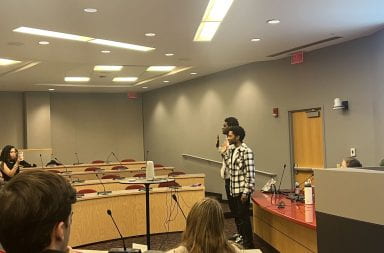Every time I go to the gym, I am honored with the montage to Jesse Owens’ legacy. Students run pickup basketball games and try to get diesel while watching themselves in the mirrors. Others run and get physical on various machines.
How many people know about Owens’ plight?
Owens is remembered for a sundry of achievements, including becoming the most decorated athlete at the 1936 Olympics. As a student-athlete, Owens won a record eight individual NCAA championships Ohio State. That record was not matched until 2006.
These accomplishments are celebrated and deservedly so, however, most people neglect his lived experience on campus. He had to live off-campus because of segregation. He did not have a scholarship because he was black, so he had to work part-time jobs to pay for school, according to William Baker’s biography about Owens, An American Life.
He returned to the United States after the Olympics and struggled to find employment. Black men were offered few opportunities to support themselves, but Owens found his chance with endorsements. After seeking those endorsements, his amateur athlete status was revoked.
Owens would become a smoker. He later would get lung cancer and die from complications of that cancer. Owens is now celebrated with accolades and buildings bearing his name. I always wonder, where were these admirers when he could not eat on campus and where was the NCAA when he needed a scholarship? In a campus tour, no one hears about how this was a campus divided or that this celebrated athlete lived an isolated experience. We only care that he ran. We can own his legs but disregard his plight.
This same disregard presented itself last week with the lack of corporate memory. On April 4, 1968, Martin Luther King Jr. was assassinated. This anniversary went by without much fanfare or reverence. The King we all know was a great man and his impact is still felt and yet, there is no connection. Students are happy to get a day off, but don’t ever think about why that day, or April 4 should be significant.
I also forgot. I forgot the significance of that day and made it through most of the day like normal. Then I was reading through my iPad’s calendar of important dates and there it was. I went the whole day without hearing his name and even though I live my life in the depth of his sacrifice, I was not compelled to remember.
A friend of mine said I was too hard on myself. The grief that I put myself through was deliberate because my success and existence is intertwined with the excellence and failures of men like these. How dare I take the liberty of forgetting their contributions? It is as if I have forgotten a piece of myself.
The future is murky because when we forget the past, we are doomed to repeat it.
Next month contains another interesting day of reflection. On May 19, Malcolm X is remembered on his birthday. Everyone knows I love a birthday. I will remember him on purpose throughout the day. I will remember his battered journey and his revelations of freedom that were seeded in community.
When we lose the ability to remember those who blazed the trail for all of us, we lose a part of ourselves.
The challenge comes when we question who will remember our present in the future.


